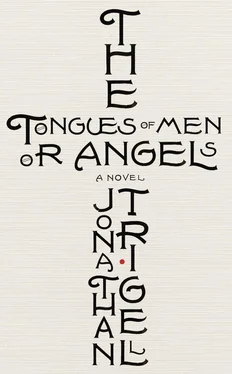But what is truth? Maybe something can be true even while it is not true. Or, rather, perhaps it can be real, as a lived experience, without being objectively true. Because are they not happier, those followers of The Way? Doesn’t their faith give them something that others lack? Doesn’t it fill a breach otherwise evident in the world and in the person? Is it really better to be wise and empty than to be foolish and filled with love?
But what does that all matter now anyway? Yeshua is dead, and those who awaited his return in Jerusalem must virtually all be dead too. Baptizer John is dead. James the Just is dead. The Judaean nation is in shattered fragments and the Temple utterly destroyed. The Way is certainly finished. What further truth could matter now?
Sixty-two Years after the Crucifixion
… if Christ has not been raised, then our preaching is futile and your faith is empty. More than that, we would then be lying about God, because we have testified that God raised Christ from the dead, whom He did not raise, if it is true that the dead are not raised. For if the dead are not raised, then not even Christ has been raised. And if Christ has not been raised, your faith is worthless …
The episkopoi reads aloud those glorious words, such gravity within them, from one of the letters Paul wrote to the Corinthian believers. The episkopoi — the bishop — has made it his solemn responsibility to gather as many of Paul’s epistles as he can. An unknown number has been lost. There were years when those didactic distortionists sent from Jerusalem were gaining such ground that the words of Paul came close to heresy. Who knows what magnificent missives were discarded as worthless or burned as dangerous? It seems scarcely conceivable these days, but at one time Paul was no longer even welcome among the congregations of great Ephesus; he left the city so utterly unbearably crushed that he despaired of life itself . But now one of Paul’s most loyal followers is Ephesus’s bishop.
For time has proved it evident that Paul was right all along: the age of the Torah has indeed been ended. How can one conduct sacrifices at a Temple that is no longer in existence? God has lit the true path with fire and fury. The whip hand has changed. Judaea has paid for the death of the Christ; and those Judaizers who once so plagued the righteous Paul have likewise received due recompense.
Lately, a copy of another work has come into the bishop’s possession — the original was written at Rome, so they say. It is an attempt to tell the tale of the Christ’s life, or at least the last year of it. It makes apparent that Jesus in fact prophesied the Temple’s destruction. And it shows how the Messiah’s family rejected him and how his weak and vacillating followers constantly misunderstood his nature and purpose and finally betrayed him. It reveals that a Roman centurion was the first to recognize that Jesus was the Son of God. And it tells how the noble prefect, Pontius Pilate, tried hard as he might to release the Messiah, but those obdurate Jews wouldn’t have it.
Such revelations come as small surprise to the bishop, who knows well how his own master Paul was plagued by Jesus’s family and misjudged by the disciples and betrayed by the Jews. In fact, the Jesus in the story is almost a reflection of Paul, though filtered, as if seen in a glass, darkly.
Paul never mentioned the details of the Christ’s betrayal; seemingly the apostle was unaware of them. In fact, he spoke of an appearance to the Twelve at a time when there would only have been eleven, had one of them turned traitor. But, then, the bishop has noticed, in all his letters, Paul never once cited a single teaching of the earthly Jesus. Paul was much more concerned with the exciting urgency of what was to come than with mere history.
Perhaps it had not seemed important for anyone to record the Christ’s earthly deeds, when he was expected to return to rule at any moment. But now it begins to seem as if the Day of the Lord has been delayed indefinitely. Those who knew Jesus as a man are long gone, and most of the generation that came after sleep too.
This new chronicle, though, the bishop was pleased to discover, finally provides a little literary completeness. For just as Judah — from whom all the Jews are descended — sold his brother Joseph, so the disciple Judas sold Jesus. Was this villain Jesus’s brother, as Joseph’s betrayer was? It is left in mist. Jesus did have a brother called Judas, but all his brothers are faint and hard to find in the story; James the Just has virtually disappeared. What is plain is that — though it must in some sense be admitted that the Christ’s disciples were all Jews — this Judas is even more ‘Jewy’ than the rest: his name means ‘Jew’ and sounds like ‘Jew’. And he is dubbed the Iscariot from Sicarii: an assassin; a nationalist; a warmonger. So, even if Paul didn’t know the story of this traitor, it certainly has a ring of truth about it.
The separation of The Way from such dastardly Hebrews is complete now, of their own volition: the scribes have recently inserted a curse on the sect of the Nazarenes into those daily prayers said in all the synagogues of the diaspora. It is no longer really possible to be Jewish and Christianoi; one must choose. Though there are rumours of remnant straggler groups in ruined Judaea, named Ebionites — the poor ones — who still claim the Messiah Yeshua was a mortal man and fulfil the Torah, as best they can, and spit diatribes against Paul.
It came too late for Paul, but the persecutions against the Christianoi in Rome ended once crazed Nero was deposed and Vespasian, hero-general of the war against Judaea, became emperor. But Paul would not have wished for sorrow to be spent on him anyway. Didn’t he once tell the bishop, with his own dear lips, that he feared not to die? He was even half eager for it, grown impatient of the Christ’s return.
In his dotage, by assembling and preserving Paul’s texts, Episkopoi Onesimus cannot help thinking that he might finally live up to his name. He has ended the volume of his collection with a letter written about him by Paul, well aware that this act holds an intimation of vanity, for the letter is almost without theological value. But so many of Paul’s mighty words have been lost that all those that remain should be cherished, and that littlest, simplest epistle — asking for a slave’s crimes to be pardoned — may bring comfort to many, not only to the bishop referred to in it. For are we not each of us in some sense a slave begging for our sins to be forgiven? Are we not all of us trying to be useful?
Useful’s offence was not really so great — though, of course, sufficient for execution — just a little figure added and subtracted here and there from accounts and bills, money that would one day have been returned to Philemon anyway: Useful had hoped only to use it eventually to buy his freedom. A debt that was in the end settled by Paul’s powerful words.
It is an irony not lost on Useful that the crime from which he fled all those years past was that of fraud, for as well as collecting Paul’s letters, Useful has himself created a few. Though those fabricated epistles are, he thinks, the kind of things Paul might have said, were he still around. Paul would doubtless have wanted to update his beliefs, in the light of events — or, rather, the lack of events, for the Christ has still not returned — so it is hardly forgery as such to write in Paul’s name. More like a flattering emulation. And if a little can be done in the process to scatter a bit of bracken over old disputes that no longer seem to matter, then all to the good.
Useful has begun to wonder, in fact, if it might not be sensible to write down the events of Paul’s life as well. For now, he can still remember much of what Paul once dictated. Grievously, the scrolls themselves remained with Paul during Nero’s persecution and must be long since lost. But Useful could likely produce a good enough replication from memory, of the acts of that apostle. And it would be well to begin the endeavour soon, for the past is a city harder to reach even than Rome.
Читать дальше












